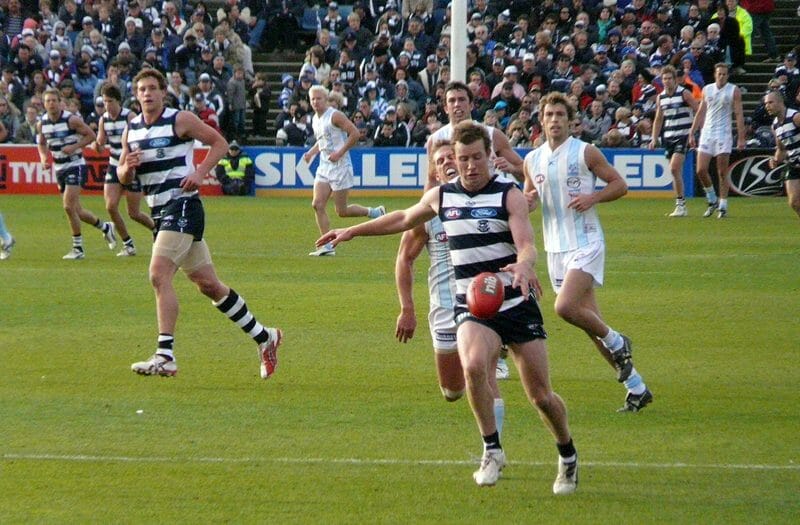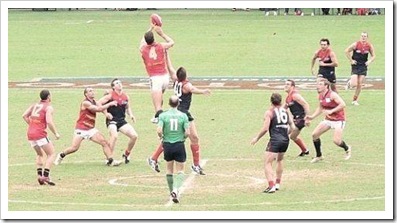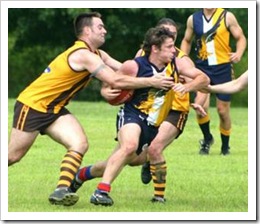
This is a story from Australia, but I am certain it is true for many other places.
I was sitting one evening and flicking through the channels when my favorite program had yet another long commercial break. One of the other channels was showing “The Footy Show”, and I paused on it for a few seconds.
The word “Footy” is short for “Australian Rules Football”, one of the preferred sports in Australia. It involves two teams of muscular men with tight clothes and various helmets and bandages, running around on a field and chasing an egg-shaped ball, with the aim of kicking it between two posts. It’s “a man’s game”, you see, where tackles abound.
Just as I was watching, there was a short clip of an incident that had happened during the previous week, in which two players slid on the grass, both trying to get the ball. One of them got it, and as he was getting up, turned and stuck his knee in the face of the other player, who was still lying on the grass. I was horrified at this, but not so the commentators.
 The panel on this show consists of 4 or 5 solid-built men, who all found this scene amusing. One of them described the incident and said, “See how he’s giving him just a little kick to the head there?” The others found it incredibly funny and laughed heartily.
The panel on this show consists of 4 or 5 solid-built men, who all found this scene amusing. One of them described the incident and said, “See how he’s giving him just a little kick to the head there?” The others found it incredibly funny and laughed heartily.
The time was just around 8:30pm, when most teenagers are still awake, and I have no doubt that this show is quite popular with them, especially with the boys. So this got me thinking about how something like this can be shown on television during teen viewing hours and how many parents may not think there is anything wrong with what I had seen.
In case you are wondering, I think there are two things wrong:
- Showing endorsement of violence on television by popular personalities delivers the message that it is all right to hurt others, at least in order to win at sports.
- I believe that public figures, including actors, models and players, should be positive role models, because their behavior is watched and repeated by the young public. Showing a player in a violent act, whatever the response that follows, delivers the message that it is OK to use violence and that in sports, as long as you do not get caught by the referee, you can do anything that will help you win.
Violence. Delivered
Now, let us take a look at how many people are involved in delivering this type of message to our young ones:
- The player – he decided to use violence in what I would consider a game. Sure, the stakes are high and winning is important for his salary, his continued employment and the support of his fans, but he could decide that winning still did not justify the use of violence against a player, who is likely to play alongside him in the state or national team anyway.
- The coach – he keeps this player on the team, because he is a winner, never mind that he roughs up the other players sometimes. Maybe the coach was the one that even taught him that “trick”. He could just as well make it clear to the player that violence is unacceptable and that would have been it.
 The team managers – same as the coach.
The team managers – same as the coach.- The league board – they should not care which team wins, but they do care what the fans want and, as there is no war in Australia, this is the closest thing to it, and it gets the crowds excited. They could very simply have suspended the player for violence long enough to make him, his coach and his team manager think differently.
- The TV show editor – he (or she, but I doubt it) chose to show this clip to the viewers, because it was juicy and aroused emotions on “both sides”. He could have easily exercised responsibility and chosen to exclude this bit from the program as inappropriate.
- The commentators – they could say very negative things about the behavior shown, but not one of them did. They all laughed and topped up the first comments with some cleverness of their own. But they are there to entertain, and this is what the people at home want, right?
- The parents of teens watching at home – they should care first and foremost for their kids’ attitude towards sports and other people. To them, who wins and who loses should be far less important, but is it? Maybe they cannot see the problem?
Take a step back
When I was growing up, I followed my hometown’s team and my country’s team and I wanted them to win. I went to games and I cared and I yelled and I clapped and I got excited. Then, we moved to the US, where I did not know any of the teams, the sports were different and I did not care anymore.
When we moved to Australia, the games changed again, this time to games I had not seen as a child, and I did not even bother to get involved.
I think this position made me look at “The Footy Show” and that violence scene without the emotions so typical to sports fans, and maybe this is the key to correcting the situation – detachment.
People out there, sport is exciting and glorious and entertaining, but if you take away your own emotional involvement, it is just a bunch of young men in shorts chasing a piece of inflated rubber, while in the meantime, they are delivering some powerful destructive message into our kids’ heads.
Wake up, I say, grab the remote and turn the TV off, or switch to the most peaceful channel you can find (and there are not many). Let your kids grow up in peace.
Yours,
Gal
 The team managers – same as the coach.
The team managers – same as the coach.










